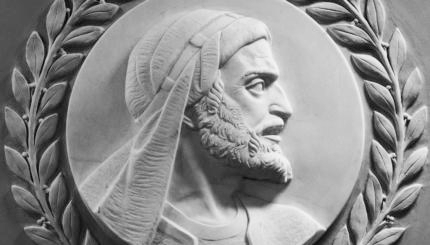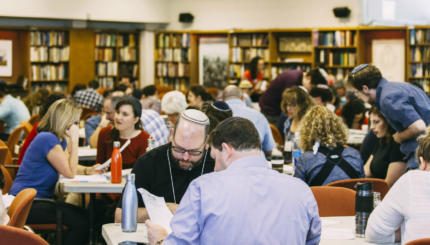Heschel takes the traditional division of Jewish textual material into halakhah (legal materials) and aggadah (legendary materials) and restates the division as Jewish behaviors (halakhah) and the reasons/motivations for those behaviors (aggadah). For Heschel, these categories transcend the simple categorization of literary genres. For Heschel, the division of literary form reflects all of the polarities of Jewish existence and theology. Reprinted with permission from Between God and Man.
Halakhah represents the strength to shape one’s life according to a fixed pattern; it is a form-giving force. Aggadah is the expression of man’s ceaseless striving that often defies all limitations. Halakhah is the rationalization and schematization of living; it defines, specifies, sets measure and limit, placing life into an exact system.
Aggadah deals with man’s ineffable relations to God, to other men, and to the world. Halakhah deals with details, with each commandment separately; aggadah with the whole of life, with the totality of religious life. Halakhah deals with the law; aggadah with the meaning of the law. Halakhah deals with subjects that can be expressed literally; aggadah introduces us to a realm that lies beyond the range of expression. Halakhah teaches us how to perform common acts; aggadah tells us how to participate in the eternal drama. Halakhah gives us knowledge; aggadah gives us aspiration.
Halakhah gives us the norms for action; aggadah, the vision of the ends of living. Halakhah prescribes, aggadah suggests; halakhah decrees, aggadah inspires; halakhah is definite; aggadah is allusive.

Help us keep Jewish knowledge accessible to millions of people around the world.
Your donation to My Jewish Learning fuels endless journeys of Jewish discovery. With your help, My Jewish Learning can continue to provide nonstop opportunities for learning, connection and growth.
When Isaac blessed Jacob he said: "God give thee the dew of heaven, the fat of the earth, and plenty of corn and wine" (Genesis 27:28). Remarked the Midrash (an early Rabbinic commentary on Scripture): "Dew of heaven is Scripture, the fat of the earth is mishnah (the first compendium of Jewish case law), corn is halakhah, wine is aggadah."
Halakhah, by necessity, treats with the laws in the abstract, regardless of the totality of the person. It is aggadah that keeps on reminding that the purpose of performance is to transform the performer, that the purpose of observance is to train us in achieving spiritual ends.…
To maintain that the essence of Judaism consists exclusively of halakhah is as erroneous as to maintain that the essence of Judaism consists exclusively of aggadah. The interrelationship of halakhah and aggadah is the very heart of Judaism. Halakhah without aggadah is dead, aggadah without halakhah is wild.
Halakhah thinks in the category of quantity; aggadah is the category of quality. Aggadah maintains that he who saves one human life is as if he had saved all mankind. In the eyes of him whose first category is the category of quantity, one man is less than two men, but in the eyes of God one life is worth as much as all of life. Halakhah speaks of the estimable and measurable dimensions of our deeds, informing us how much we must perform in order to fulfill our duty, about the size, capacity, or content of the doer and the deed. Aggadah deals with the immeasurable, inward aspect of living, telling us how we must think and feel; how rather than how much we must do to fulfill our duty; the manner, not only the content, is important.
To reduce Judaism to law, to halakhah, is to dim its light, to pervert its essence and to kill its spirit. We have a legacy of aggadah together with a system of halakhah, and although, because of a variety of reasons, that legacy was frequently overlooked and aggadah became subservient to halakhah, halakhah is ultimately dependent upon aggadah. Halakhah, the rationalization of living, is not only forced to employ elements that are themselves unreasoned, its ultimate authority depends upon aggadah. For what is the basis of halakhah? The event at Sinai, the mystery of revelation, belongs to the sphere of aggadah. Thus while the content of halakhah is subject to its own reasoning, its authority is derived from aggadah….
To reduce Judaism to inwardness, to aggadah, is to blot out its light, to dissolve its essence and to destroy its reality. Indeed, the surest way to forfeit aggadah is to abolish halakhah. They can only survive in symbiosis. Without halakhah, aggadah loses its substance, its character, its source of inspiration, its security against becoming secularized.
By inwardness alone we do not come close to God. The purest intentions, the finest sense of devotion, the noblest spiritual aspirations are fatuous when not realized in action. Spiritualism is a way for angels, not for man. There is only one function that can take place without the aid of external means: dreaming. When dreaming, man is almost detached from concrete reality. Yet spiritual life is not a dream and is in constant need of action. Action is the verification of the spirit. Does friendship consist of mere emotion? Of indulgence in feeling? Is it not always in need of tangible, material means of expression? The life of the spirit too needs concrete actions for its actualization. The body must not be left alone; the spirit must be fulfilled in the flesh. The spirit is decisive; but it is life, all of life, where the spirit is at stake. To consecrate our tongue and our hands we need extraordinary means of pedagogy.
It is impossible to decide whether in Judaism supremacy belongs to halakhah or to aggadah, to the lawgiver or to the Psalmist. The rabbis may have sensed the problem. "Rav said: The world was created for the sake of David, so that he might sing hymns and psalms to God. Samuel said: The world was created for the sake of Moses, so that he might receive the Torah" (Babylonian Talmud Sanhedrin 98b)….
There is no halakhah without aggadah, and no aggadah without halakhah. We must neither disparage the body nor sacrifice the spirit. The body is the discipline, the pattern, the law; the spirit is inner devotion, spontaneity, freedom. The body without the spirit is a corpse; the spirit without the body is a ghost. Thus a mitzvah is both a discipline and an inspiration, an act of obedience and an experience of joy, a yoke and a prerogative. Our task is to learn how to maintain a harmony between the demands of halakhah and the spirit of aggadah.
Abraham Joshua Heschel (1907-1972) was professor of Jewish ethics and mysticism at the Jewish Theological Seminary of America and one of the outstanding Jewish philosophers and theologians of modern times.
Midrash
Pronounced: MIDD-rash, Origin: Hebrew, the process of interpretation by which the rabbis filled in “gaps” found in the Torah.

Help us keep Jewish knowledge accessible to millions of people around the world.
Your donation to My Jewish Learning fuels endless journeys of Jewish discovery. With your help, My Jewish Learning can continue to provide nonstop opportunities for learning, connection and growth.
mitzvah
Pronounced: MITZ-vuh or meetz-VAH, Origin: Hebrew, commandment, also used to mean good deed.

Help us keep Jewish knowledge accessible to millions of people around the world.
Your donation to My Jewish Learning fuels endless journeys of Jewish discovery. With your help, My Jewish Learning can continue to provide nonstop opportunities for learning, connection and growth.
Talmud
Pronounced: TALL-mud, Origin: Hebrew, the set of teachings and commentaries on the Torah that form the basis for Jewish law. Comprised of the Mishnah and the Gemara, it contains the opinions of thousands of rabbis from different periods in Jewish history.

Help us keep Jewish knowledge accessible to millions of people around the world.
Your donation to My Jewish Learning fuels endless journeys of Jewish discovery. With your help, My Jewish Learning can continue to provide nonstop opportunities for learning, connection and growth.


